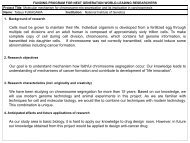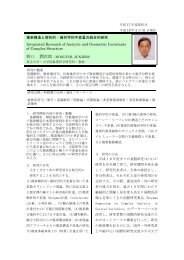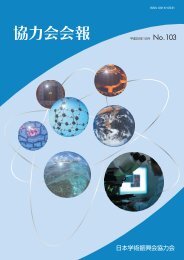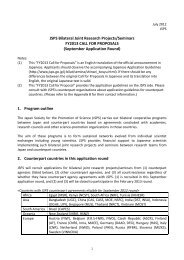- Page 2:
Japan Society forthe Promotion of S
- Page 5:
December 20, 2002From: Hiroo Imura,
- Page 8:
Japan Society for the Promotion of
- Page 11 and 12:
After the meeting, the committee ch
- Page 13 and 14:
natural sciences and engineering.Th
- Page 15 and 16:
lic understanding of science.The sc
- Page 17 and 18:
To support "elite” researchers is
- Page 19 and 20:
External Review Report1. JSPS's Bas
- Page 21 and 22: 3. Overview of JSPS and Its Program
- Page 23 and 24: Future issues related to JSPS’s o
- Page 25 and 26: Finding promising young researchers
- Page 27 and 28: Flexible use of research fundsGener
- Page 29 and 30: ences, or publishing books in field
- Page 31 and 32: and corporations to exchange inform
- Page 33 and 34: Problems associated with elite rese
- Page 35 and 36: (3) Research Fellowship for Young S
- Page 37 and 38: 6. JSPS's International Exchange Pr
- Page 39 and 40: Third, regarding JSPS’s bilateral
- Page 41 and 42: process of peer-reviewed proposals.
- Page 43 and 44: 8. Expectations in JSPSJSPS has ove
- Page 45 and 46: Review Committee MembersProfessor S
- Page 47 and 48: Professor Sir Michael John Berridge
- Page 49 and 50: Professor Erling NorrbySecretary Ge
- Page 51 and 52: Dr. Akito ArimaMember of the House
- Page 53 and 54: Professor Hiroyuki ToriiEditorial W
- Page 55 and 56: External Review of JSPS ProgramsRev
- Page 57 and 58: Development of International exchan
- Page 59 and 60: List of AcronymsCOECRESTDCFYIAIIRCP
- Page 61 and 62: R&D expenditure by sector (amount u
- Page 63 and 64: yen)- Grants-in-Aid for Scientific
- Page 65 and 66: (2) University research activitiesT
- Page 67 and 68: councils (faculty meetings, senate,
- Page 69 and 70: Research System at UniversitiesThe
- Page 71: themselves (private universities) i
- Page 75 and 76: establishing Japan in second place
- Page 77 and 78: variety of fields, as central stron
- Page 79 and 80: investment, around 17 trillion yen
- Page 81 and 82: expansion of recruitment system bas
- Page 83 and 84: - Development of intellectual found
- Page 85 and 86: closure of universities.(b) Organiz
- Page 87 and 88: technology funding requests were th
- Page 89 and 90: SpecialCoordinationFunds forPromoti
- Page 91 and 92: transparency and introduction of se
- Page 93 and 94: Government Science and Technology S
- Page 95 and 96: promote scientific research as a wa
- Page 97 and 98: losses of researchers participating
- Page 99 and 100: The bill was passed by both the Hou
- Page 101 and 102: Science Program launched in 1963, b
- Page 103 and 104: a nation which had gone from underd
- Page 105 and 106: program. In FY1979, however, a prog
- Page 107 and 108: provide advice and/or academic expe
- Page 109 and 110: one director general, up to three d
- Page 111 and 112: Advisory Council Senior Academic A
- Page 113 and 114: Liaison Offices.In reflection of th
- Page 115 and 116: the following March, with the budge
- Page 117 and 118: JSPS organization and mechanisms ne
- Page 119 and 120: part of his administrative reform c
- Page 121 and 122: Chapter III. Research Grants(1) Gra
- Page 123 and 124:
applications, and has also conducte
- Page 125 and 126:
of total research costs which can b
- Page 127 and 128:
The major difference between this c
- Page 129 and 130:
groups and have already proved prac
- Page 131 and 132:
CategoriesScientific Research(S)Aid
- Page 133 and 134:
means that only researchers at rese
- Page 135 and 136:
Grants-in-Aid for Scientific Resear
- Page 137 and 138:
Grants-in-Aid Organizational ChartJ
- Page 139 and 140:
discipline and related disciplines
- Page 141 and 142:
organization’s inception, and has
- Page 143 and 144:
a key technique in non-destructive
- Page 145 and 146:
students who have passed a review b
- Page 147 and 148:
This program sought to improve and
- Page 149 and 150:
up posts at Japanese universities a
- Page 151 and 152:
suggests that in addition to foster
- Page 153 and 154:
West Germany and France”, as a co
- Page 155 and 156:
(ii) Persons wishing to become full
- Page 157 and 158:
to April 1 of the year in which the
- Page 159 and 160:
each discipline. In the case of PD
- Page 161 and 162:
of both the applicant (host researc
- Page 163 and 164:
Royal Society (RS)UKBritish Academy
- Page 165 and 166:
Chapter V. International Scientific
- Page 167 and 168:
In addition, in FY2000, the JSPS in
- Page 169 and 170:
evaluated highly.(c) Joint Seminars
- Page 171 and 172:
* Purpose and Outline of the Progra
- Page 173 and 174:
esearchers to leading scientists an
- Page 175 and 176:
External Review of JSPS ProgramsSta
- Page 177 and 178:
New and Continued ProjectsCategoryS
- Page 179 and 180:
New and Continued ProjectsCategoryN
- Page 181 and 182:
FY2000As of April 1, 2000PD DC Tota
- Page 183 and 184:
Postdoctoral Fellowship for Researc
- Page 185 and 186:
Postdoctoral Fellowships for Foreig
- Page 187 and 188:
V. International Scientific Exchang
- Page 189 and 190:
Region Country 1991 1996 2000 2001R
- Page 191 and 192:
Number of Fellowships by CountryReg
- Page 193 and 194:
JSPS Award for Eminent ScientistsFY
- Page 195 and 196:
Chapter II. Overview of the Japan S
- Page 197 and 198:
Chapter III. Research Grants(1) Cha
- Page 199 and 200:
Chapter IV. Fostering Researchers(1
- Page 201 and 202:
accordance with the number of fello







